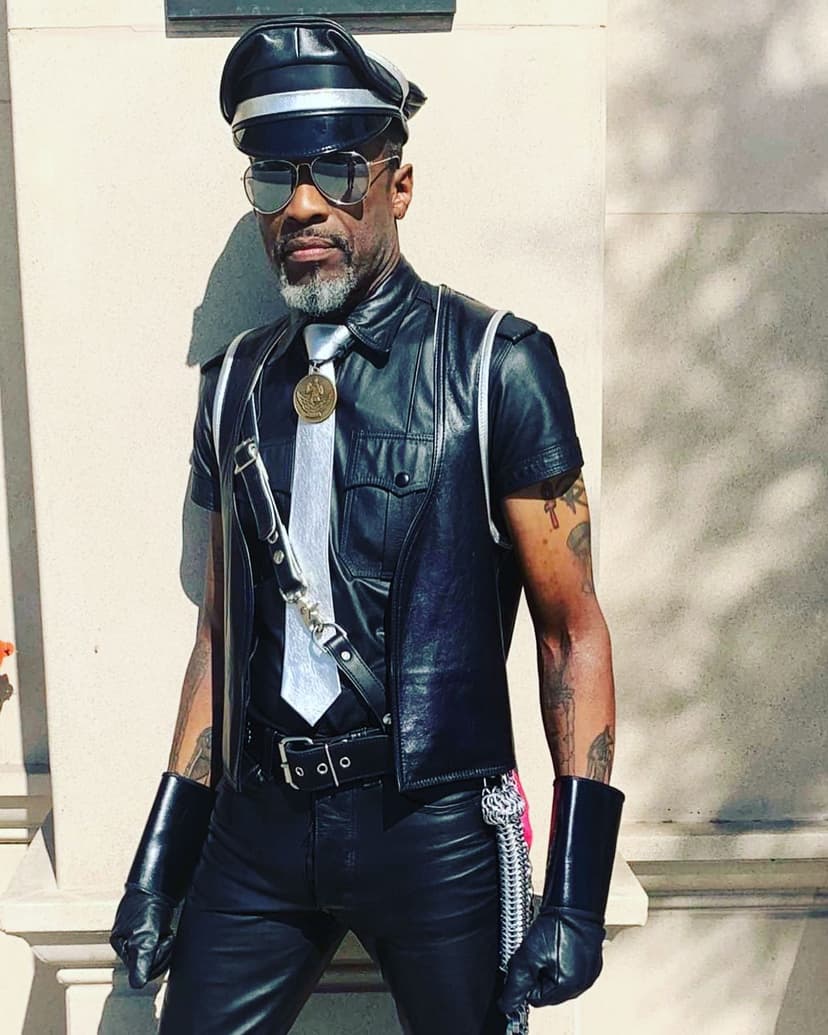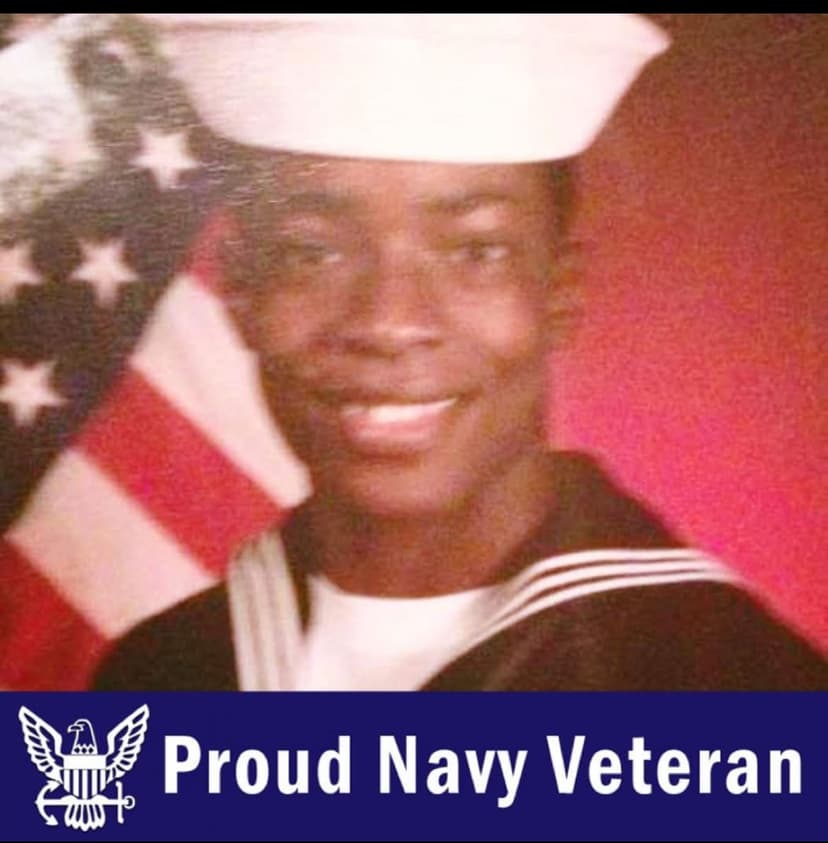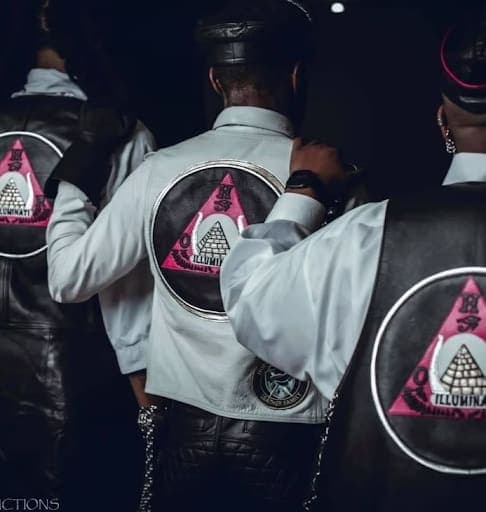Elias P. Fishburne IV, also known as Eli Onyx and Mr. Maryland 2016, among other titles, is a New York native whose journey has taken him from the vibrant streets of Manhattan to the cultural landscape of Charleston, South Carolina, and beyond. After experiencing the challenges of growing up Black in the South and seeking a more progressive environment, Elias joined the Navy in 1988. His eleven and a half years of service not only provided structure and opportunity, but also became a catalyst for self-discovery, particularly around sexual identity.
Recognizing a lack of representation, he founded groups and created symbols, like the Leather Boy of Color and Leather Girl of Color flags, to ensure people of color had spaces in the community. After his military service, Elias built a career in cosmetology as the owner of Elias IV Hair DC. He is also the head of household and master of The Illuminati House of Ra, a Leather BDSM Family. He hosts a podcast on The Illuminati House of Ra’s YouTube channel. Elias is an activist and advocate for Black veterans and LGBTQ+ voices, encouraging others to find supportive spaces and speak their truths.
Alesha Alexcee: So… Elias, can you tell me about yourself? Like, your background, where you were born, how do you identify, in terms of being a part of the LGBTQ community?
Elias P. Fishburne: Okay, I was born in Manhattan, New York. I moved away from New York during my middle school years, and moving to Charleston, South Carolina, was a big cultural change. I think it helped my development as a person. As an adult, I realize it gave me the opportunity to see the diversity of people. New York brought together many groups that I took for granted.
Moving to Charleston taught me that I had to be more aware of how people perceive me as a Black person. I took that for granted, living up north. I wanted to escape Charleston, so I went to school there, returned, and eventually went to Atlanta, where I saw progressive people of color. When I moved back to Charleston, I knew I had to leave again, and that's what led me to the military. The military became my way to escape and learn about myself, to self-identify.
Exploring those avenues, I realized I had more options regarding my sexuality. I struggled with labeling myself; first bisexual, then gay, then pansexual as I grew more comfortable with myself. The military's 'Don't Ask, Don't Tell' policy was traumatizing because it forced me to hide who I was. People talk about code switching now, but we've been doing it our whole lives. Eventually, I found a sense of belonging in the leather community, which opened up a whole new world for me.
I enjoyed the leather community because it provided the structure I was used to from the military. I saw a need for spaces for people of color, so I created the Leather Boy of Color and Leather Girl of Color flags and founded groups for them. When I looked at clubs like the Leather Boys of Chicago or DC, I noticed only one or two people of color. I knew there were more out there who identified similarly, so I wanted to create a space where we could come together.
I wanted us to have our own group, to stand on our own and do what we needed for ourselves, because we move and communicate differently.

Elias in their leather regalia
AA: Wow, you did a lot. You've done a lot. And thank you for creating those spaces. So you talked about the reason why you joined the Army. It was to escape South Carolina, right?
EF: Yeah, I joined the Navy.
AA: So, when did you join?
EF: I joined in '88.
AA: And then, how long did you serve for?
EF: Was it 88 or 89? I think it was around 89 or 90. I stayed in for eleven and a half years.
AA: Did you find it hard to transition out of active duty?
EF: Transitioning to civilian life was hard for me. The toughest part was finding spaces where people wanted to work as much as I did. I preferred working alone. Relying on others made my job harder, and I often felt I was overcompensating. While in the military, I went to school for cosmetology and decided to make a career of it. When I left the Navy, I learned that the only two jobs that survived the depression were morticians and cosmetologists.
People are always gonna get their hair cut, they're always gonna get hair done, and people are always gonna die. Even when people die, they still need their hair done and makeup and everything, so…that was the path that I chose, only because my greatest fear is to be homeless. It was a career path done out of necessity, or I should say, it was done out of the need for security.
I think that was the biggest thing. I will say this: the military always emphasized the importance of working as a team. When your brother is down, you help pick them up; that's the camaraderie. It's difficult when you get out, and if you don't have a support system, it can really be rough. I was fortunate that most of my first clients were from the base. As they supported me in my career path, the better I got at doing what I do. I've been in DC for 30 years since I left the military, so I think I'm doing pretty well.

Photo courtesy of Elias P. Fishburne
AA: Yeah, that sounds amazing. As a Black veteran and member of the LGBTQ community, were you able to find support within any military spaces, such as organizations or veteran-associated organizations, or simply from other military personnel in general?
EF: So, I was shocked that when I went, for the longest time, you hear a lot of negative conversation about going to the VA. Oh, they are too slow, they don't do this, and da-da-da-da-da. So for a long time, I continued to go to Bethesda Medical Center for all the things. And, because that was my last duty station. I never brought my total…LGBT, personality to that space. My energy became more relaxed as I went to the VA hospital. I think I was dealing with a different group of people, a different set of people.
They got me registered [in New York], they got me in the system, they pull my records, because, you know, for some reason, the VAs interlock with each other. However, the Navy hospital and the active-duty hospitals don't coordinate with the VA at all. Their systems are totally different. But when I tell you those people got me all together. They did not let me go. They got my finger infection down. I still have my finger. They just really took good care of me, and from that day forward, I ended up switching and felt more comfortable going to the VA, so I go to the VA here in DC.
I have to give the VA credit. When I went to Pride a couple of years ago, they had a tent to inform people about benefits.
It hurts to have been silenced when I would have loved to be more open. I remember getting flack for organizing the AIDS walk group at Bethesda Medical Center. Some people supported it, others didn’t. I was always willing to push boundaries and stand up for what I believed in, even if it meant getting in trouble.
Yeah, all of those things, you know, all of that anxiety, all of that fear, when seeing that tent, all of that came up, and I was just like, wow, now we're here.

Photo courtesy of The House of Ra
AA: Okay, if you had any advice for other Black queer service members or transitioning veterans, what would it be?
EF: My advice to them would be, before you get out, wherever you reside, to find Black spaces that can support you. Find whatever your skill level was in the military. Not only see how that skill level can be used on the outside to help Black communities for a job, something that's payable, but also use those skill sets to maybe volunteer and help other minorities in our community.
Talk to each other. Use social media to create spaces where we can talk about our experiences. A lot of times, I think that Black voices from the military are often overlooked because we don't use those social media outlets to tell our experiences. I think that it's important for us as Black veterans, Black gay veterans, to make it known that we exist. That, you know, Don't Ask, Don't Tell, often silenced us. Silencing us made it easy for us to be erased. I try to use social media platforms with my leather community. But, even speaking now, I think I need to add, you know, veteran, too, so a vet can know that he can be kinky, too.
This interview was conducted by Alesha Alexcee, digital issue co-editor, a Black and queer, non-binary strategic storyteller, policy advocate, and consultant residing in St. Paul, MN.













